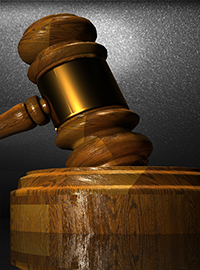| Trump Lawfare: The Next Stage Begins |
 |
|
By Byron York
Wednesday, March 27 2024 |
Donald Trump was first indicted nearly a year ago, on April 4, 2023, when Manhattan District Attorney Alvin Bragg announced charges against the former president over a nondisclosure agreement Trump used to buy the silence of porn actress Stormy Daniels, with whom he had apparently had a brief sexual encounter. Bragg, an elected Democrat, won office by promising to go after Trump, and go after Trump he did. Resurrecting an allegation that more responsible law enforcement agencies had declined to prosecute, Bragg came up with 34 felony counts against Trump, each of which carried a maximum sentence of four years in prison, which theoretically would result in 134 years behind bars for the former president. On Monday, Judge Juan Merchan announced that the trial will begin April 15. The indictment was weak in a variety of ways. First, the main charge, that Trump falsified business records in 2016, was a misdemeanor with a two-year statute of limitations. Even if Bragg could somehow jack the charges into a felony, which carries a five-year statute of limitations, the time in which Trump could be charged had passed. But wait – during the pandemic, when courts virtually shut down, New York, in a one-time-only move, extended its statute of limitations to six years, which allowed Bragg to get the Trump charges in right under the wire. But only if he could charge Trump with a felony. So Bragg contended that Trump committed the misdemeanor of falsifying records in the act of committing another crime, which elevated the falsification charge to a felony. The problem was, Bragg has never clearly said what the other crime was. He appears to be relying on a dubious theory that Trump violated federal election law – a theory that didn't work when the feds used it against John Edwards – which Bragg, as a local prosecutor, does not have the authority to enforce. Those are the legal defects of the case. Then there is its political import, which is heading into a new phase. Before April 4, 2023, nobody knew how being indicted might affect Trump's candidacy for the Republican presidential nomination. Back then, Trump led GOP challenger Ron DeSantis by around 15 points. After Bragg's indictment, Trump's support shot up and DeSantis' support trended downward. A 15-point lead became a 30-point lead. Subsequent indictments have either further increased Trump's support among Republican primary voters or had no effect at all. Those voters have processed the whole indictment issue, and many have come to the conclusion that the charges are politically motivated attacks by elected Democrats, like Bragg or Fulton County, Georgia, District Attorney Fani Willis, or by the special counsel chosen by the Biden administration, Jack Smith. In all, Trump, now the presumptive Republican nominee, is in a stronger place politically than he was before he was first indicted. As he said in an interview recently, "Who would have thought that?" Now the indictments, or at least one indictment, will turn into a trial. A deep-blue Manhattan jury is likely to convict Trump on at least some of the charges. What might happen then? That is the prospect that raises Democratic hopes, at least for now. They have seen a number of polls that show some portion of voters who are now open to voting for Trump say that they would not vote for him if he were a convicted felon. From a campaign standpoint, that is the great promise of the Bragg indictment. It can turn Trump into a convicted felon before the election, even as the other criminal cases against Trump sputter with delay after delay. Bragg, some Democrats believe, could have the power to turn voters in Biden's direction. Or perhaps not. There is another Trump conviction political scenario. Back when Bragg indicted the former president, some Democrats were uncomfortable with the fact that the first of several anticipated indictments against Trump was also the weakest case. Democrats know as well as anyone else that Bragg's case is a bad one, and some worried that by going first, the weakest case would cause some voters to dismiss all the Trump prosecutions as weak and politically motivated. Now, what if the effect of a conviction in the Bragg case is to diminish the prosecution, and not the defendant? And then, by extension, to diminish all of the prosecutions against Trump? Not in the eyes of the Democratic base or many in the media, of course – nothing would diminish their opposition to Trump – but in the eyes of voters who might seriously be considering voting for Trump as the better of the binary choice with Biden. I am not saying that will happen. But I am saying that so far, the Democratic lawfare campaign against Trump has had some unintended consequences, and there is no reason to believe that, once a trial begins, everything will finally start going according to the Democratic plan. There could be more surprises to come. Byron York is chief political correspondent for The Washington Examiner. COPYRIGHT 2024 BYRON YORK |
Related Articles : |
























